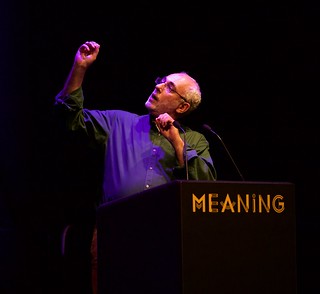Well, that was the fun. The nice people at the Meaning Conference gave me 13 minutes to try to explain what a blockchain technology is, what blockchains might do, and what the implications might be, to an audience of largely creative people. Quite a challenge.
Since they were creative types, I thought I ought to frame my explanations with poetry rather than mathematics. I decided to start with the Ur-statement of ordered immutability, the Rubiyaat of Omar Khayyam:
“The Moving Finger writes; and, having writ,
Moves on: nor all thy Piety nor Wit
Shall lure it back to cancel half a Line,
Nor all thy Tears wash out a Word of it.”
You can see the revised version of the slide deck here (we accidentally sent the wrong version on the day, but it really didn’t matter). It sets out the revised “4x4x4” model of shared ledgers, so that there is context for talking about the blockchain, and then quickly works through how there are different kinds of blockchains (and bitcoin is only one) and then gets to what I think will be the lasting impact: ambient accountability, new kinds of transaction environments where traditional auditing and policing are taken care of by the environment itself.
In order to explain my focus on ambient accountability, we went back to poetry, this time with T.S. Eliot and choruses from The Rock (1934).
“They constantly try to escape
From the darkness outside and within
By dreaming of systems so perfect that no one will need to be good.”
xxx
They were kind to me with their feedback, although going back over the presentation I’m a little disappointed with it. I think I can do better to bring the new world of the shared ledger to the general audience. So I’d appreciate your feedback on two elements of the presentation. First, does the six layer “real world ledger” model help with the discussion or is it an unnecessary complications and second do the example ledgers presented across those six layers make sense? I want to quickly show the different types of ledger in one slide.



Comments
Post a Comment